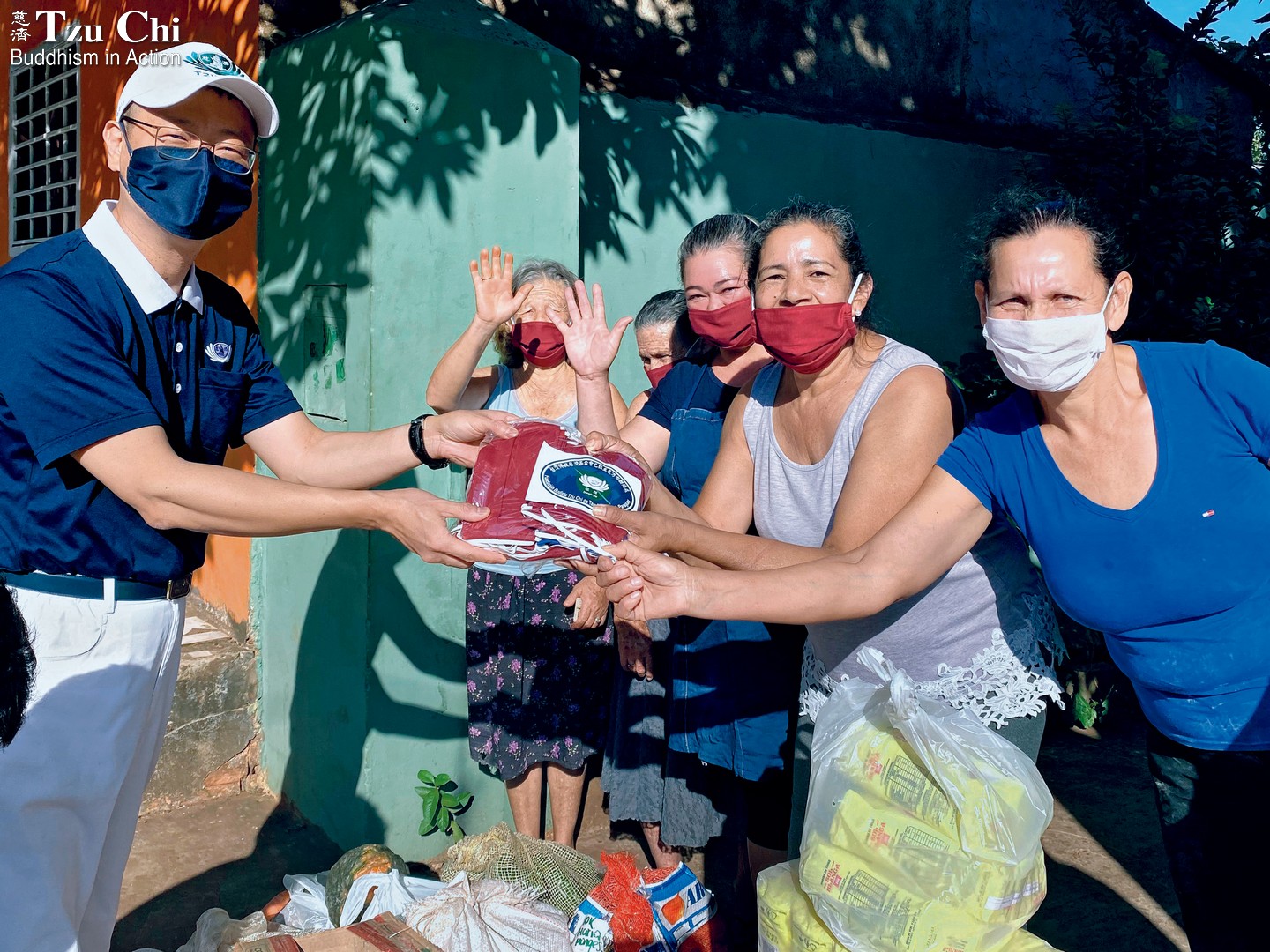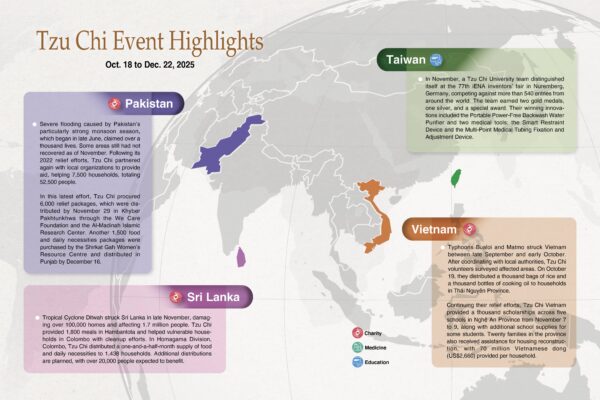By Cai Qi-ru and Song Jin-sheng
Translated by Wu Hsiao-ting
Photo by Cai Qi-ru
Dumplings and pieces of dough sizzled in a frying pan while milk warmed over a coal fire. This was the scene at a hot food station in Paraguay, set up to provide meals to impoverished people during the coronavirus pandemic. Tzu Chi Paraguay helped keep such stations going by donating food and ingredients.

Volunteers deliver food and masks to a hot food station in Pablo Roja, in Ciudad del Este.
Two vehicles loaded with 4,200 kilograms (9,260 pounds) of food sped along a suburban road outside of Ciudad del Este, the second largest city in Paraguay. The vehicles carried Tzu Chi volunteers from the city as they delivered and replenished supplies for some hot food stations set up to feed people whose lives had been rendered difficult by the pandemic. When the volunteers arrived at one of the stations at a private home in Minga Guazú, about 20 kilometers (12 miles) from Ciudad del Este, people there broke into cheers and hugged one another. Some even burst into tears.
Maria, one of the volunteer moms at the station, said that they deeply appreciated the donated food from Tzu Chi. “Some families around here have as many as six to eight children,” she said. “The youngsters often have to go hungry. Some of them, when they see our food running low, start to beg for more food from us because they won’t have anything to eat for dinner. We can’t help but feel like crying.” She thanked the Tzu Chi volunteers profusely as she received the food and ingredients they had brought: rice, flour, adzuki beans, cooking oil, and fresh vegetables. The volunteers had even brought some cloth masks.
Paraguay was one of the first countries to take measures to stem the spread of COVID-19 when the virus spread to South America. School was suspended, public gatherings banned, and borders closed. The preventive measures effectively contained the spread of the infection in the country, especially when compared with other South American nations, but the nationwide lockdown created another problem: the sharp increase in the number of people going hungry.
Seeing the need, charity groups and women in different communities began providing hot food to the underserved in March to prevent them from starving. In early April, Tzu Chi volunteers in Ciudad del Este learned that some of the hot food stations were running out of food. In response, they purchased and delivered food and ingredients to stations located in Ciudad del Este, Ciudad Presidente Franco, and Minga Guazú.
Soon thereafter, Tzu Chi Ciudad del Este’s Facebook page saw a spike in requests for help. Volunteers began visiting different hot food stations every week to deliver ingredients. By May 5, they had provided 41 stations with enough ingredients to prepare 50,000 servings of food. Fidelio Baez, who oversaw a hot food station in a slum, said, “Thank God for helping us through you. The much-awaited food is finally here. Thank you so much!”
Across the Friendship Bridge
Ciudad del Este is located on the border of Paraguay, separated from Brazil by the Paraná River. It’s a commercial city and one of the world’s largest free-trade zones. Its tax-free status attracts many Brazilians to the city to shop. The Friendship Bridge links Ciudad del Este with Foz do Iguaçu, the city on the Brazilian side. When the Friendship Bridge was closed to prevent the spread of COVID-19, the livelihoods of many families on both sides were impacted. Not only were some residents of Ciudad del Este going hungry, but so were some on the other end of the bridge, in Foz do Iguaçu.
Xie Jia-hong (謝家弘) is a Tzu Chi volunteer in Brazil. As a tour guide, he often crosses the Friendship Bridge to show tourists around Ciudad del Este. When he learned that some slum residents in Foz do Iguaçu were so short on food they had to drink water to feel full, he decided to act. He enlisted the help of some of his colleagues, and they delivered 500 portions of food, each weighing nearly 13 kilograms (29 pounds), to a charity organization, Associação Fraternidade Aliança (AFA), for distribution to the needy. They also delivered emergency food supplies to a nursing home and to Associação de Pais e Amigos do Excepcionais, an organization that provides education to special needs people from underprivileged families.
AFA director Cristina Rinaldi said that many locals make a living by carrying goods across the bridge for their customers, doing odd jobs, or salvaging garbage. When their livelihoods were wiped out or diminished due to the pandemic, many had no choice but to go without food for days on end. The 500 portions of food—enough to help 500 families—would be extremely helpful to them.
Paraguay started lifting its lockdown measures in May, but because the coronavirus situation in Brazil was still severe, the border between the two countries remained closed. In addition to helping hot food stations, Tzu Chi volunteers continued to deliver food to the foundation’s long-term aid recipients and to offer them help with rents. Volunteers also provided medical professionals with personal protective equipment. With the pandemic still developing, they are committed to continuing to help people ride out this difficult time.



